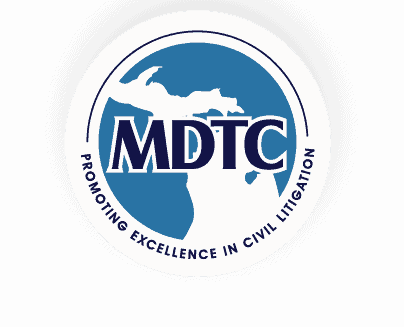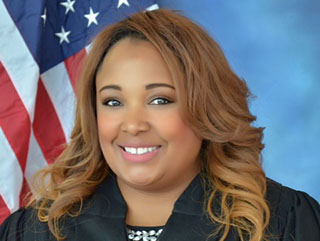Qiana Denise Lillard
- What has been your most memorable case (in practice and/or as a judge)?
My most memorable is case is my very first jury trial. It was an insurance fraud case involving a vehicle rated for personal use that was actually being used for business. It wasn’t that complex of a case but because it was my very first jury trial I will never forget it.
- What do you enjoy doing in your spare time?
Kickboxing and watching all Notre Dame Sports
- Who was the most influential person in your life/profession?
My grandfather Henry Tyus. He always believed in me and encouraged me that I could achieve anything I wanted. He passed away in 2007 and there is a vigorous debate among grandchildren as to who is actual favorite grandchild was… of course I maintain it was me
- What’s the most unusual thing in your desk drawer?
A light up shamrock necklace I wear on the bench on St Patrick’s day and before any major Notre Dame Sporting event
- What has been the most difficult decision you have had to make as a judge?
Termination of parental rights. It’s a permanent decision that has a generational impact on families. I am glad I don’t have to make those types of decisions anymore I have a great deal respect for the judges sitting in the Wayne County Juvenile division most people have no idea the magnitude of the choices they have to make on a daily basis.
- Do you have a pet peeve when on the bench?
Lawyers who are inappropriately dressed. Failure to come to court in business attire is very disrespectful of the Court litigants, clients and jurors. Attorneys should wear business attire whenever appearing in court regardless of if it’s for a pretrial hearing, settlement conference or a jury trial.
- What advice would you give to litigants before you?
Civility goes a long way. You can be a fierce advocate for your respective clients without engaging in vitriol.
- Do you have any advice for new lawyers or law students?
Adhere to the principles exposed by the late Jude Kaye Tertzag “be prompt be prepared and be polite”. If you establish your reputation as being timely to court, well prepared and polite to your opposing counsel it will go a long way in furthering your career and it will make you a better lawyer.
- Football, Hockey, Baseball or Basketball (or other)?
All three if it involves Notre Dame
- What is your favorite music?
Anything by Beyonce’
- How would you finish this sentence: “If I was no longer on the bench I would be…?”
teaching trial advocacy and writing the great American Novel.
- What law school did you attend? Did you “enjoy” the experience and can you share your fondest memory?
The University of Notre Dame Law School. I loved my time at Notre Dame for both undergrad and law school. My fondest memory is watching air force one fly over my diploma ceremony in front of the reflecting pool in front of the mural painted on the side of the Hesburgh library (more commonly known as touch down Jesus) President George W. Bush was the commencement speaker at our graduation ceremony and therefore as we were receiving our law school diplomas afterward at a separate ceremony air force one flew overhead. It was a pretty amazing moment
- Before becoming a judge where did you practice?
After law school I worked in the legal department at Detroit Edison, Michigan Basic Property Insurance Association and AAA Michigan. I also worked as an assistant prosecuting attorney for Wayne County
- Did you have any mentors as you gained experience in the law and practice?
I had several most of whom all participated in my investiture ceremony when I became a judge Wayne County Prosecutor Kym L. Worthy, the late Hon. Willie G. Lipscomb Jr 36th District Court, Thomas J Killeen and Sheila Walker.
- How old where you when you had the worst hair cut ever and what style was it?
When I was 6 or 7 my mother was in cosmetology school and learning to style the 80’s trend known as the Jehri Curl. My brothers and I played the unfortunate role of her practice models. Let’s just say those are some childhood photos I’d rather forget.
- What was the hardest part of transitioning from law practice to being a judge?
The isolation. Being a judge requires you to change the way you socialize. There are a lot of places you can no longer go or things you can no longer do once you take the bench. Even simple things like participating in social media or going out to lunch and dinner with practicing attorneys can cause problems for a judge if you aren’t very careful. For the most part on a daily basis you really don’t interact with people beyond the staff assigned to your courtroom. I am a very social person so that was the biggest adjustment for me.
- Do you take an active role in assisting parties in settlement discussions? Do you prefer independent facilitation/mediation?
Currently assigned to the criminal division my role in pretrial resolution of a case is very limited
- If you could be any animal what would it be and why?
A house cat … they pretty much have it made they get to just lay around the house and have some human wait on them hand and foot or would that be paw and claw? At any rate I think they have it made
- Do you prefer attorneys to remain at the lectern in trials if they are speaking or questioning?
The courtroom is the stage for a litigator and the trial is their theater they should be free to move about the courtroom
- Without embarrassing anyone, do you have a memorable courtroom gaffe of yours or an attorney you can share?
As a practicing attorney I was trying a major homicide case with national media attention I stood to question a witness and had no idea the zipper on my pants was completely undone. The officer in charge had to tap me and let me know the front door was wide open. I was mortified!! Also when I first took the bench I had a habit of saying objection when something objectionable was said by a litigant. Having been a trial lawyer for so many years it was just a reflex or instinct to say objection when I heard the rules of evidence being broken and it took about a month for me to stop doing that

